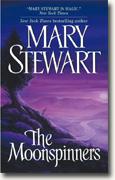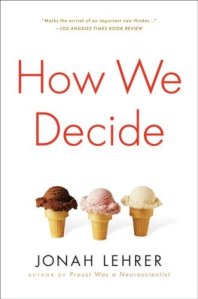So. In the interest of catching up (really this time), I'm just going to post a few thumbnail-type reviews.
14. The Moonspinners, by Mary Stewart
****
I love this book, and re-read it every year around Easter time (yes, that's how far behind I am with my reviews) and then spend the next few months dreaming of Mediterranean holidays. This book chronicles the adventures of Nicola Ferris, a secretary at the British embassy in Athens, who takes an Easter holiday with her cousin in an out-of-the-way village in Crete. She promptly stumbles into a mystery involving a pair of brothers, kidnapping, thievery, boats, crab-pots and both attempted and accomplished murder. The action is great, but what I love best about this book is the feeling of place that the descriptions evoke. I can easily picture myself into the landscape and always come out of the book slightly bewildered and disappointed that I'm no longer sitting on a patio in the Greek sunshine sipping mint drinks. Four stars.
15. How We Decide, by Jonah Lehrer
***
This was another Kindle Daily Deal which I picked up on a whim because I thought, looking at the title, that it might help me with some of my less-decisive tendencies. In fact, in the author's note on this book, he explains that he decided to write it because he was tired of spending fifteen minutes in the cereal aisle trying to decide between Apple Cinnamon and Honey Nut Cheerios every time he went grocery shopping. However, this book isn't a how-to guide like you might expect, but more of a how-do guide to the brain and its inner workings. Lehrer opens each chapter with a fascinating story of a real-life situation in which a type of decision was made (such as the Mann Gulch fire, which Megan talked about in her review of Young Men and Fire), and then talks about what parts of the brain and which brain functions influenced, prevented, or made such a decision possible. Most of the time it was fascinating, although sometimes I admit I got bogged down in the super-scientific parts. But if you are interested in the ways the brain works and affects such things as panic, intuition, gambling, autism, serial killers, memory, addiction, etc., then you'll enjoy this book. The writing style is clear and coherent so that even the super-technical parts are understandable, and the storytelling parts are, quite simply, riveting. Unfortunately, though, it didn't help with my cereal selection process. Three stars.
16. Bridget Jones' Diary, by Helen Fielding
***
It had been several years since I'd read this, and flying out of my home state and hometown to move to a new city across the country called for something light-hearted. My Kindle offered me this. And it did what it needed to, in that I was distracted and diverted, but I was a bit disappointed to find out that I didn't enjoy it quite as much as the first time I'd read it. Maybe it's that I've gotten older and don't have the patience for as much juvenile-type behavior as Bridget engages in. I don't know. Despite my impatience with some of her antics, though, Bridget did manage to get in a few great lines, for which I must give her (and Fielding) due credit. My favorite lines this time around (in no particular order):
On the end of a relationship:
It's no good. When someone leaves you, apart from missing them, apart from the fact that the whole little world you've created together collapses, and that everything you see or do reminds you of them, the worst is the thought that they tried you out and, in the end, the whole sum of parts adds up to you got stamped REJECT by the one you love. How can you not be left with the personal confidence of a passed-over British Rail sandwich?
On trying to set the VCR record function:
Feel exactly the same as feel when trying to follow signposts on roads. Know in heart that signposts and video manual do not make sense but still cannot believe authorities would be so cruel as to deliberately dupe us all. Feel incompetent fool and as if everyone else in world understands something which is being kept from me.
And of, course, the classic:
It struck me as pretty ridiculous to be called Mr Darcy and to stand on your own looking snooty at a party. It's like being called Heathcliff and insisting on spending the entire evening in the garden, shouting "Cathy" and banging your head against a tree.
All in all, a fun read. Three stars.
17. The 39 Steps, by John Buchan
****
In the interest of full disclosure, I "read" this in audiobook format, which I still think totally counts, while pushing a napping toddler around the apartment complex. This book follows expatriate Scot Richard Hannay, who has recently returned to London from southern Africa and is about to die of boredom. He has determined to leave the country again when he is approached by a stranger claiming to hold information vital to the security of the nation, and who pleads for Hannay's assistance in hiding him until he can contact the proper people. Hannay puts him up for the night but ignores the wilder flights of his guest's tales of political plotting. However, when his guest is murdered, leaving Hannay his notebook, Hannay finds that he must not only believe the wild tales of his guest, but must also dodge both the British police (who suspect him of being the murderer) and a formidable force of foreign spies bent on silencing Hannay before he can thwart their nefarious plans.
Bottom line: great book. Lots of action, lots of intrigue, lots of close calls and lots of fun. I'd seen several film adaptations of this story so was excited to get the chance to discover the original. I think the original is of course the best, but was surprised by just how many universal elements from the adaptations were missing from the original book. For example, I kept waiting and waiting for the beautiful woman to appear so they would be forced to run across Scotland handcuffed together and outwitting dangerous spies and . . . nothing. No woman at all other than one or two throwaway characters like farmers' wives and the like.
I was pleased to find, however, that the resourcefulness, daring and general awesomeness that characterize the Richard Hannay of the adaptations were all there and more. Definitely a character you enjoy spending time with, and certainly one you'd want to have on your side in a pinch. Four stars.
I loved the version I listened to (done by BJ Harrison of The Classic Tales Podcast). I highly recommend checking out his podcasts and audiobooks if you haven't yet done so.




